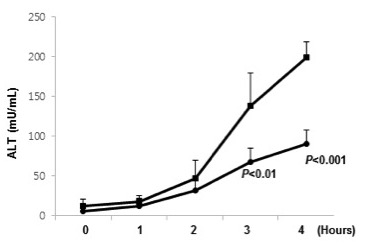Improved Preservation During Normothermic Ex-Vivo Liver Perfusion with Delta Opioid Agonist (D-Ala2, D-Leu5) Enkephalin (DADLE).
1Department of Surgery, Division of Transplant, The Ohio State University Wexner Medical Center, Columbus, OH
2Departments of Pediatrics and Internal Medicine, The Ohio State University Wexner Medical Center, Columbus, OH
Meeting: 2017 American Transplant Congress
Abstract number: D62
Keywords: Ischemia, Liver, Liver transplantation, Warm ischemia
Session Information
Session Name: Poster Session D: Ischemic Injury and Organ Preservation Session III
Session Type: Poster Session
Date: Tuesday, May 2, 2017
Session Time: 6:00pm-7:00pm
 Presentation Time: 6:00pm-7:00pm
Presentation Time: 6:00pm-7:00pm
Location: Hall D1
Background: The metabolic demand of donor livers during prolonged normothermic ex-vivo perfusion with its associated oxygen stress is a challenge. Delta opioid agonist (D-Ala2, D-Leu5) enkephalin (DADLE), a synthetic opioid, with properties similar to hibernation induction trigger (HIT), has been shown to protect against oxygen stress and reperfusion injury in the brain, spinal cord and liver. We hypothesized that DADLE would protect against oxidative stress and preserve organ function in a rodent model of normothermic ex-vivo liver perfusion.
Materials and Methods: The concentration of DADLE needed to induce protection and associated mechanism(s) were investigated using primary culture vascular endothelial cells and hepatocytes. Normothermic ex-vivo liver perfusion with DADLE was used to characterize the ability of DADLE to improve preservation of potential donor organs.
Results: DADLE is protective against oxidative stress as demonstrated by dose-dependent improvements in endothelial and hepatocyte viability, and reductions in cell toxicity and LDH release. DADLE is protective in a rodent liver model of normothermic ex-vivo perfusion. At 3 and 4 hours, perfusate ALT of livers treated with DADLE was significantly lowered  (p<0.01). Additionally, tissue ATP and GSH were higher and tissue MDA and apoptotic cells lower in livers perfused with DADLE (p < 0.01), demonstrating maintained cell metabolism and decreased lipid peroxidation and cell death. Oxygen consumption was improved in cells and livers treated with DADLE (p<0.05).
(p<0.01). Additionally, tissue ATP and GSH were higher and tissue MDA and apoptotic cells lower in livers perfused with DADLE (p < 0.01), demonstrating maintained cell metabolism and decreased lipid peroxidation and cell death. Oxygen consumption was improved in cells and livers treated with DADLE (p<0.05).
Conclusions: DADLE was not toxic to endothelial cells or hepatocytes and is capable of improving cell viability, decreasing cytotoxicity and maintaining cell metabolism. In a rat model of normothermic ex-vivo liver perfusion, use of DADLE improved organ preservation and function. The use of DADLE may allow for prolonged normothermic ex-vivo perfusion by maintaining organ function and viability.
CITATION INFORMATION: Beal E, Kim J, Hayes Jr. D, Washburn K, Whitson B, Black S. Improved Preservation During Normothermic Ex-Vivo Liver Perfusion with Delta Opioid Agonist (D-Ala2, D-Leu5) Enkephalin (DADLE). Am J Transplant. 2017;17 (suppl 3).
To cite this abstract in AMA style:
Beal E, Kim J, Jr DHayes, Washburn K, Whitson B, Black S. Improved Preservation During Normothermic Ex-Vivo Liver Perfusion with Delta Opioid Agonist (D-Ala2, D-Leu5) Enkephalin (DADLE). [abstract]. Am J Transplant. 2017; 17 (suppl 3). https://atcmeetingabstracts.com/abstract/improved-preservation-during-normothermic-ex-vivo-liver-perfusion-with-delta-opioid-agonist-d-ala2-d-leu5-enkephalin-dadle/. Accessed February 21, 2026.« Back to 2017 American Transplant Congress
